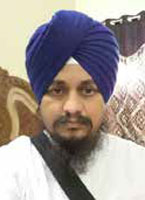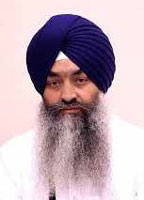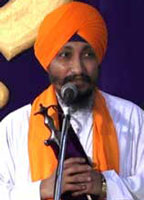Jathedar in Punjabi means a leader of a group or community. In Sikh religion, Jathedar is an ordained Leader of the clergy and leads a Takht, a sacred and authoritative seat. There are five such sacred seats as discussed above. Thus, the Sikh clergy consists of five Jathedars ,one each from five takhts or sacred seats They are heads of the respective Takhts. Akal Takht being the oldest and the seat of administrative decisions and rendering justice right from the time of its founder, Sri Guru Hargobind Sahib, it has always held the supreme position. So, the decisions taken and edicts issued by Jathedar Sri Akal Takht sahib get priority over those of other jathedars. Generally all important panthic decisions are taken by Jathedar Sri Akal Takht sahib in consultation with other jathedars.
In the 18th century, all important Panthak issues were discussed in and decisions taken by Sarbat Khalsa (a gathering of all the Sikhs who assembled at Sri Akal Takht Sahib for discussing common issues) So, the appointment of jathedars was also made by SARBAT KHALSA. when SGPC came into being, it became the appointing authority of Jathedars in Punjab. The duties of the Jathedars are supposed to include satisfying of queries of the seekers on Sikh religious matters, dealing with interfaith matters, representing Sikh religion
and presenting Sikh view point in inter faith gatherings, giving advice on Sikh issues, dealing with complaints against individuals and organisations regarding Gurmat misconduct and violations, and awarding Tankhah (religious punishment) in conformity with the tenets and teachings as contained
in Sri Guru Granth Sahib, Sikh historical precedents and accepted traditions,
resolving conflicts among individuals or groups of Sikhs, doing Dharam Parchar
by Kirtan or discourses and, if necessary, issuing edicts in the form of directives
for the Sikhs to do or not to do certain things. In performing all these duties they
are supposed to observe the principles of natural justice and also keep in view
the law and public policies of the Government. It has been noticed that in the
absence of any prescribed procedure or rules regarding selection and functioning
of Jathedars, their decisions many a times become controversial. For example,
the decision of Jathedar Sahib regarding granting pardon to Gurmeet Ram Rahim
of Dera Sacha Sauda (who has since been convicted for rape charges by the court
)was not accepted by the Sikhs and as such was withdrawn Similarly, the decisions
regarding Sikh calendar in 2003 and later on in 2015 caused resentment among
some or the other groups of Sikhs. The need is to have a prescribed procedure
and set of rules regarding the selection and functioning of Takht Jathedars. They
must also be given competent advisers, qualified staff, a suitable establishment and
autonomy to function. They should work in the interest of panth keeping in view
the welfare of all, without any pressure and political interference that will give them the requisite status, glory
and honour


